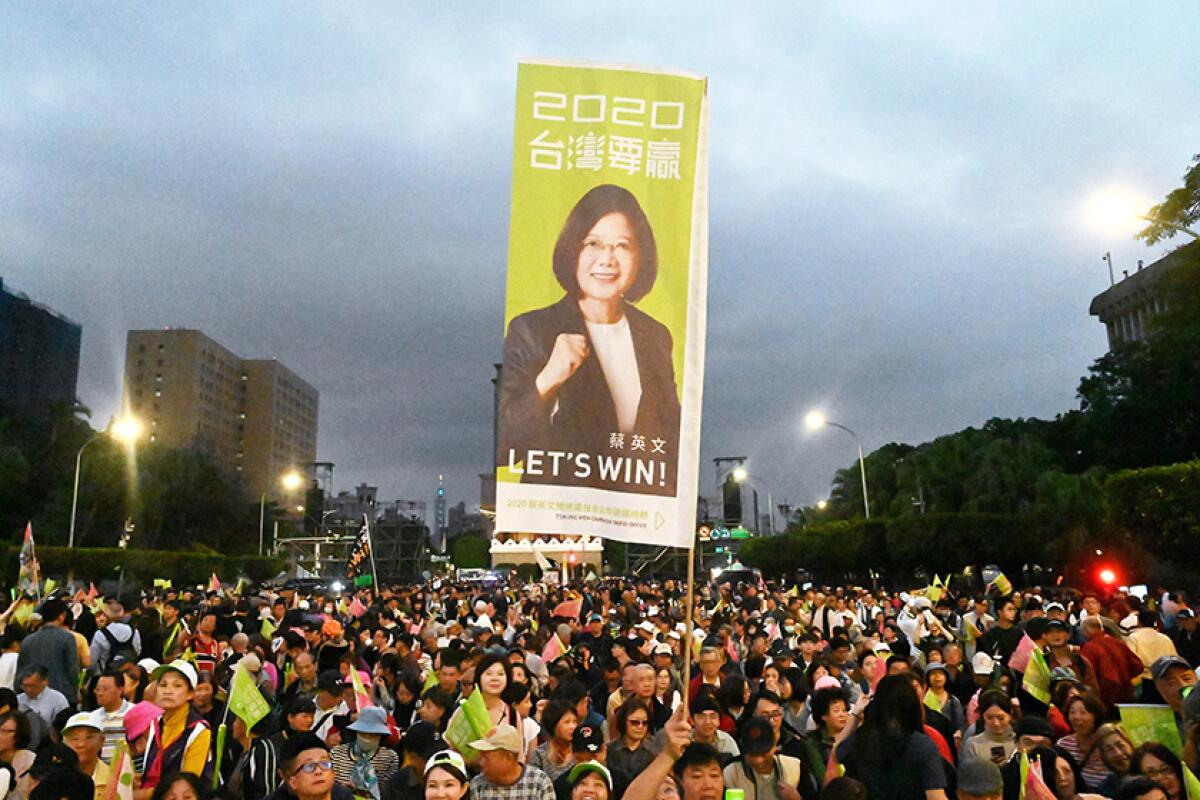China threat looms large on eve of Taiwan presidential election

TAIPEI, Taiwan — Further deadlock and heightened pressure from China are the likely outcome if Taiwan’s independence-leaning President Tsai Ing-wen wins a second term this weekend, as is widely predicted.
Tsai, of the Democratic Progressive Party, was leading by a comfortable margin in most polls before the standard blackout period on surveys was imposed 10 days before Saturday’s election.
In a distribution center in Xindian district in New Taipei City on Friday, schoolteachers and other volunteers were busy preparing stacks of ballots and other election paraphernalia for distribution to the polling centers.
“We are here to maintain security and make sure no one smuggles out any printed ballot forms,” said Chu Kuo-hong, deputy chief of Xindian district police station.
Final campaign rallies for each candidate were scheduled for the evening in Taipei and in the southern city of Kaohsiung, where her chief opponent, Han Kuo-yu of the opposition Nationalist Party, is mayor. Another candidate, James Soong of the smaller People First Party, also planned a rally.
Tsai’s party lost badly in local elections 14 months ago. But she has received a boost from hostile words and actions from China and months of anti-government protests in Hong Kong which she says show Beijing’s “one country, two systems” formula for governing Taiwan is untenable.
The island’s high-tech economy has also helped. Stock market prices have remained robust and wages risen slightly, partly thanks to Taiwanese exporters relocating from China to cut costs and avoid the bruising effects of the U.S.-China trade war.
Han Kuo-yu has slumped in the polls following a series of gaffes and allegations of shady financial dealings. He has clung to a pro-China policy despite widespread distrust of the mainland and the backlash against Beijing’s handling of the Hong Kong protests.
On Saturday, voters will also elect a 113-member legislature, where Tsai’s Democratic Progressive Party currently has 68 seats. The Nationalists hold 35 seats with the rest taken by minor parties and independents.
Taiwan elections generally revolve around economic, public welfare and social justice issues, China’s threat to annex the island by force always looms large in the background.
Even more so this year.
China has taken an especially hard line against Tsai since her 2016 inauguration, infuriated by her refusal to endorse its claim that Taiwan and the mainland belong to a single China.
Beijing cut off all formal ties with her government, restricted visits by Chinese tourists, excluded Taiwan’s representatives from international gatherings and peeled away more of the island’s dwindling diplomatic allies, leaving it with just 15.
Stepping up its threats, Beijing has in recent months held military exercises across the Taiwan Strait, sailed both of its aircraft carriers through the waterway that divides Taiwan from the mainland and flown air patrols around the island.
However, in an apparent effort to avoid antagonizing voters, Chinese leader Xi Jinping didn’t renew the threat of using force against Taiwan during his annual New Year’s Eve address even though he reiterated China’s firm opposition to Taiwan’s formal independence. Chinese state media have been notably silent on the election campaign.
Analysts say the low-key approach masks a more subtle campaign to back Han and Nationalist candidates for the legislature through media manipulation and social media campaigns.
Seeking to scupper such attempts, the legislature last month passed an anti-infiltration bill laying out fines and prison sentences for those seeking to manipulate Taiwan’s political system on behalf of China or other foreign powers.
In comments to the international media on Thursday, Taiwan’s Foreign Minister Joseph Wu said Tsai’s government doesn’t plan to rock the boat with a formal declaration of independence.
“Maintaining the status quo is in the best interest of everyone concerned. We will not provoke any conflict with China, but we are absolutely determined to defend Taiwan’s democracy,” Wu said.
More to Read
Sign up for Essential California
The most important California stories and recommendations in your inbox every morning.
You may occasionally receive promotional content from the Los Angeles Times.










